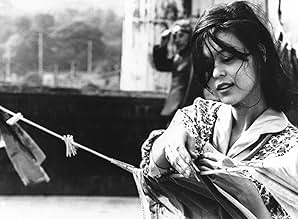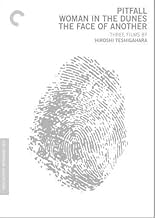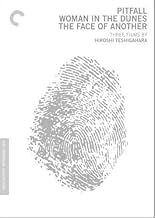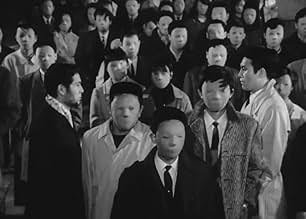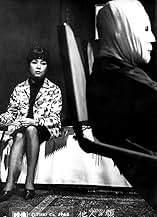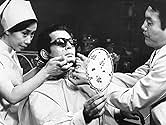A businessman with a disfigured face obtains a lifelike mask from his doctor, but the mask starts altering his personality.A businessman with a disfigured face obtains a lifelike mask from his doctor, but the mask starts altering his personality.A businessman with a disfigured face obtains a lifelike mask from his doctor, but the mask starts altering his personality.
- Awards
- 2 wins total
Robert Dunham
- Foreign man in Bar
- (uncredited)
Featured reviews
An accident at work has taken place, the result means you are left, without a face, only bandages for cover, they envelope and they smother, your existence now in limbo, an unfilled space. An opportunity arises to evolve, to put the past behind, to be absolved, present with a new profile, posturing with a new style, a future about which, you can revolve.
A fascinating piece of film making that has many layers and interpretations. For me, I see Mr. Okuyama representing post war Japan, the accident that removes his features the raw wound of two atomic bombs, the bandages a place to hide while the country considers its future and the new face, the new Japan, that finds a way to integrate itself into a modern world, while holding on to traditions and cultures that take a little more time to retune as the situation clarifies. Any film with Machiko Kyô performing is always a bonus too.
A fascinating piece of film making that has many layers and interpretations. For me, I see Mr. Okuyama representing post war Japan, the accident that removes his features the raw wound of two atomic bombs, the bandages a place to hide while the country considers its future and the new face, the new Japan, that finds a way to integrate itself into a modern world, while holding on to traditions and cultures that take a little more time to retune as the situation clarifies. Any film with Machiko Kyô performing is always a bonus too.
Mr. Okuyama is involved in an accident at work which melts off his face and this understandably is constantly nagging him. This makes a mark on the relationship with his wife as he talks out at her about how miserable he is and what a monster he has become. He then talks his psychiatrist into making him a new face (which was quite easily done since the psychiatrist has had these kind of thoughts before) and he then goes on 'vacation'.
This is so excellent in every way. It is not a sci-fi movie, but in feel it sometimes comes close to. The images are quite surreal at times, the music is out of this world and some of the sets are not to be found in real life.
The editing is masterfully done, switching between main story and a parallel story about a girl with a similar problem, as well as switching between hand-held camera (not too shaky though), still pictures and still standing camera. The pictures of Segawa Hiroshi fits 35mm nicely, sometimes manipulating the background like I haven't seen before for example when the psychiatrist and Mr. Okayama is talking at the club and the crowd behind get 'invisible' by lighting.
Kyou Machiko did a terrific job in Ozu's 'Ukigusa' and likewise here. Too bad we don't see that much of her. Nakudai Tatsuya plays well as the mask. I don't know exactly what was special effects and not, but it was hard to tell.
Author and writer of screenplay Abe Koubou, director Teshigahara Hiroshi and Takemitsu Touru was behind another favourite of mine; 'Suna no Onna'. They also made 'Moetsukita Chizu' and I cant wait to get my hands on it!!
This is so excellent in every way. It is not a sci-fi movie, but in feel it sometimes comes close to. The images are quite surreal at times, the music is out of this world and some of the sets are not to be found in real life.
The editing is masterfully done, switching between main story and a parallel story about a girl with a similar problem, as well as switching between hand-held camera (not too shaky though), still pictures and still standing camera. The pictures of Segawa Hiroshi fits 35mm nicely, sometimes manipulating the background like I haven't seen before for example when the psychiatrist and Mr. Okayama is talking at the club and the crowd behind get 'invisible' by lighting.
Kyou Machiko did a terrific job in Ozu's 'Ukigusa' and likewise here. Too bad we don't see that much of her. Nakudai Tatsuya plays well as the mask. I don't know exactly what was special effects and not, but it was hard to tell.
Author and writer of screenplay Abe Koubou, director Teshigahara Hiroshi and Takemitsu Touru was behind another favourite of mine; 'Suna no Onna'. They also made 'Moetsukita Chizu' and I cant wait to get my hands on it!!
Mr. Okuyama (Tatsuya Nakadai) is a physically and emotionally wounded man. After an industrial accident at work, his face has been scarred and mutilated beyond recognition, and even his wife rejects him, even though she says his physical appearance doesn't matter. It has left him bitter and angry, until his psychiatrist Dr. Hira (Mikijiro Hira) comes up with a way to fashion a 'face mask' that will give him the appearance of having a completely normal face, albeit with a few joining marks. Hira doesn't do this just out of kindness, he is fascinated how this new face will alter Okuyama's personality and way of life.
The Face of Another is a fascinating film that highlights the social attitudes to physical appearance. There are hundreds of films and morality tales that teach you that it is inner beauty that counts, and once you allow this to shine then your physical attractiveness becomes irrelevant. Everyone knows that this is bullshit, so its refreshing to see a film that makes it clear from the outset that physical appearance has a massive part to play in society. Okuyama's new face, which is an attractive one, changes him so much that he takes on an almost dual identity. Dr. Hira delights in telling him that he has bought flashy new clothes, something he was never concerned with before. It becomes clear that whilst before Okuyama merely wanted to be normal again and fit back in society, his new face is engulfing him, and to be 'normal' simply isn't enough anymore.
As with many of the Japanese New Wave film-makers of the 1960's-70's, director Hiroshi Teshigahara takes some bold steps and sneaks in some surrealist and art-house values in a movie that is otherwise played relatively straight. A 'fictional' character appears every now and then throughout (she is first imagined by Okuyama's wife as a character in a movie); one side of her face is scarred and burned. She appears quite rarely, but seems to serve as an alternative to Okuyama's increasingly vain soul. Another scene seems a ball of hair that floats in the air, unnoticed by the people in the laboratory. I have no idea what it meant, and couldn't really admit to it being wholly successful, but it certainly got my attention nonetheless.
A powerful, disturbing, and poignant drama/horror from the greatest era in Japanese cinema. The film seems all the more important now, 45 years on, in a world where a botox injection can be as easy as buying a pack of cigarettes, and where physical 'beauty' is less a bonus than a necessity.
www.the-wrath-of-blog.blogspot.com
The Face of Another is a fascinating film that highlights the social attitudes to physical appearance. There are hundreds of films and morality tales that teach you that it is inner beauty that counts, and once you allow this to shine then your physical attractiveness becomes irrelevant. Everyone knows that this is bullshit, so its refreshing to see a film that makes it clear from the outset that physical appearance has a massive part to play in society. Okuyama's new face, which is an attractive one, changes him so much that he takes on an almost dual identity. Dr. Hira delights in telling him that he has bought flashy new clothes, something he was never concerned with before. It becomes clear that whilst before Okuyama merely wanted to be normal again and fit back in society, his new face is engulfing him, and to be 'normal' simply isn't enough anymore.
As with many of the Japanese New Wave film-makers of the 1960's-70's, director Hiroshi Teshigahara takes some bold steps and sneaks in some surrealist and art-house values in a movie that is otherwise played relatively straight. A 'fictional' character appears every now and then throughout (she is first imagined by Okuyama's wife as a character in a movie); one side of her face is scarred and burned. She appears quite rarely, but seems to serve as an alternative to Okuyama's increasingly vain soul. Another scene seems a ball of hair that floats in the air, unnoticed by the people in the laboratory. I have no idea what it meant, and couldn't really admit to it being wholly successful, but it certainly got my attention nonetheless.
A powerful, disturbing, and poignant drama/horror from the greatest era in Japanese cinema. The film seems all the more important now, 45 years on, in a world where a botox injection can be as easy as buying a pack of cigarettes, and where physical 'beauty' is less a bonus than a necessity.
www.the-wrath-of-blog.blogspot.com
I loved the premise, appreciated the philosophy, and enjoyed some of the avant-garde bits of filmmaking here, but I don't think this film quite lived up to its full potential, and it didn't fully connect with me.
From the start, there are existential themes of isolation and absurdity, and the man's condition reminded me of Gregor Samsa waking up and discovering he was a giant bug. With his face heavily bandaged, he's alienated from everyone around him, including his wife, who shrinks from his touch. The film explores identity, acceptance, and whether the mask or persona we adopt liberates or controls us. The minor parallel story of the young woman with the scar on her face also deals with a mask of sorts, and isolation.
Existentialism was common after WWII, and perhaps heightened in Japan by its having lost the war, and gone through more dramatic changes politically and psychologically. Maybe the young woman in the minor story, with burns apparently suffered in childhood at Nagasaki, is a symbol for the country's scars, and its identity fundamentally changing. Similarly, maybe the man losing his face from an accident at work is a symbol for the modern or corporate world changing us, as we work as cogs in a machine.
I loved to think about those things, but the film doesn't expand on them as profoundly as it could have. Instead of a character arc that shows some form of change in the man over time, it gives us mostly dialogue which doesn't land as philosophically as I think it was intended, and commits the sin of telling us instead of showing us in the process. The doctor gives us dire warnings about far more changes than we actually see. Having the man's primary focus be to seduce his wife while disguised in his new mask was unimaginative and uninspired, though I did like thinking about the irony of this being the opposite of love, which should involve an unmasking and getting to one another's 'true self.' There are also banal bits like women putting on make-up being yet another form of mask. As for the parallel story, with the incest, rising sun, and oblivion, I think there is symbolism and some level of desperation or despair here, but it's not strong, and narratively it probably should have been at least loosely integrated with the main story.
Overall though, the film is well worth seeing. The production value is high, with that ultra-cool doctor's office, and the assortment of creative visual tricks director Hiroshi Teshigahara gives us, including freeze frames and surreal imagery. The striking scene in the crowd towards the end is also fantastic, and the film's best. My favorite line to ponder was this one: "I wonder if we see the true face of a gem when it's polished, or in the rough."
From the start, there are existential themes of isolation and absurdity, and the man's condition reminded me of Gregor Samsa waking up and discovering he was a giant bug. With his face heavily bandaged, he's alienated from everyone around him, including his wife, who shrinks from his touch. The film explores identity, acceptance, and whether the mask or persona we adopt liberates or controls us. The minor parallel story of the young woman with the scar on her face also deals with a mask of sorts, and isolation.
Existentialism was common after WWII, and perhaps heightened in Japan by its having lost the war, and gone through more dramatic changes politically and psychologically. Maybe the young woman in the minor story, with burns apparently suffered in childhood at Nagasaki, is a symbol for the country's scars, and its identity fundamentally changing. Similarly, maybe the man losing his face from an accident at work is a symbol for the modern or corporate world changing us, as we work as cogs in a machine.
I loved to think about those things, but the film doesn't expand on them as profoundly as it could have. Instead of a character arc that shows some form of change in the man over time, it gives us mostly dialogue which doesn't land as philosophically as I think it was intended, and commits the sin of telling us instead of showing us in the process. The doctor gives us dire warnings about far more changes than we actually see. Having the man's primary focus be to seduce his wife while disguised in his new mask was unimaginative and uninspired, though I did like thinking about the irony of this being the opposite of love, which should involve an unmasking and getting to one another's 'true self.' There are also banal bits like women putting on make-up being yet another form of mask. As for the parallel story, with the incest, rising sun, and oblivion, I think there is symbolism and some level of desperation or despair here, but it's not strong, and narratively it probably should have been at least loosely integrated with the main story.
Overall though, the film is well worth seeing. The production value is high, with that ultra-cool doctor's office, and the assortment of creative visual tricks director Hiroshi Teshigahara gives us, including freeze frames and surreal imagery. The striking scene in the crowd towards the end is also fantastic, and the film's best. My favorite line to ponder was this one: "I wonder if we see the true face of a gem when it's polished, or in the rough."
After an industrial accident that leaves his face disfigured for life, Mr. Okuyama (Tatsuya Nakadai)begins to question the meaning of life and his own identity, should he keep working, will his disgusted wife ever sleep with him again. His psychotherapist offers him the chance to avail of an illegal medical practice that he has invented, it's a mask moulded from the face of another, that Okuyama can wear to live life a little more normally. The mask gives him a new lease of life, but his therapist warns him that the mask could take over and influence him to do evil things. As the mask takes control Okuyama can't resist but to give in to his baser instincts, his main plan being, to seduce own wife, that he believes may be cheating on him anyway. With thematic echoes of Franju's Les Yeux sans visage and even Delmer Daves Dark Passage, Teshigahara delivers his expressionistic adaptation of Kôbô Abe's novel with style, the results being a dark and epic tale that will haunt its viewers. Its full of inventive visuals and clever tricks with sound, which along with Tôru Takemitsu's superb score contribute wonderfully to the theme of how fragile identity really is and how the masks we all wear hide our true beings and souls. There's also a secondary story of an unnamed facially deformed girl, who is also struggling to cope with her disfigurements and her tragedy is equally moving.
Did you know
- TriviaDirector Hiroshi Teshigahara said that he intended the film to explore both personal and cultural identities. While the examination of personal identity is quite overt, Teshigahara also explored how Japan's cultural identity had been impacted by World War II and its aftermath.
- Quotes
Psychiatrist: You're not the only lonely man. Being free always involves being lonely. Just there is a mask you can peel off and another you can not.
- ConnectionsReferenced in Les Funérailles des roses (1969)
- How long is The Face of Another?Powered by Alexa
Details
Box office
- Gross worldwide
- $35,185
- Runtime2 hours 2 minutes
- Color
- Sound mix
- Aspect ratio
- 1.33 : 1
Contribute to this page
Suggest an edit or add missing content




